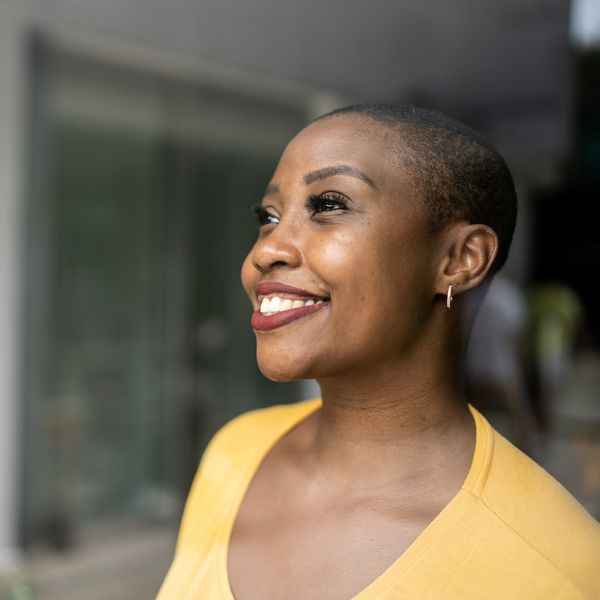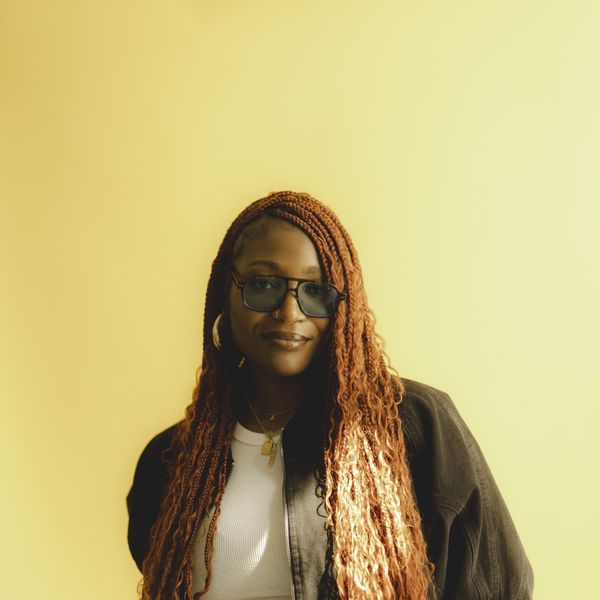Self-employment is something many people prefer or aspire to, as being your own boss is both admirable and empowering. And women are bossing up more than ever, representing almost 40% of all self-employed professionals. Being self-employed myself, I can attest to the benefits, but like everything in life, there are two dueling sides to every coin. And if you're considering taking the leap from 9-to-5er to self-employed, there's a lot to consider before totally pulling the plug on your day job.
Here are a few things to know, from my own experience, before transitioning into self-employment:
1. Recognize that self-employment is not entrepreneurship.
There are key differences between being an entrepreneur and being self-employed that many people get all mixed up and confused about. The terms are often used interchangeably, but they are definitely not the same.
A self-employed person operates just like an employee, often offering services and talents to business owners, nonprofits, or organizations. An entrepreneur typically offers goods and services to a client or customer, registers their business for tax purposes, and can reap the benefits of resources like business bank accounts, financing, and investments.
When you're self-employed, you often don't get paid if you don't work, most typically as a freelancer or on a project-by-project or client-by-client basis. When you're an entrepreneur, you can successfully scale a business where you can reap the benefits whether you're actively working in it or not.
You can indeed launch a one-person business (i.e., as a limited liability company or LLC), but there are requirements related to that, particularly when it comes to taxes. There are also things to consider, such as lifestyle, goals, and risk tolerance. The annual and financial obligations entrepreneurs have aren't the same as self-employed professionals, like additional taxes, filing fees, and mandatory financial reports.

pixdeluxe/Getty Images
(I know some of y'all entrepreneurs might be reading this with a side-eye, but hey, not every self-employed person is a business person, and some simply might not want the extra maintenance and responsibilities of having a registered business, no matter the perks.)
While I'm not discouraging any self-employed person from launching a business, knowing the difference between the two is important because it sets the tone for how you approach the work that you do, your expectations on the lifestyle and requirements, and what benefits might be afforded to you.
Many entrepreneurs can employ people, scale their businesses for expansion, get capital investment, and even take days, weeks, or months off without having to actually work yet still reap the benefits. This is often not the case for a self-employed person whose salary largely depends on actual work hours, paid invoices, and strategic budgeting.
2. Inform yourself about the tax obligations and other financial shifts that might happen once you are self-employed.
When you're working a 9-to-5, your company handles taking taxes out of each check. This is not the case for self-employed folk. There's a quarterly schedule that must be followed for federal taxes, and there are other regulations based on the state where you primarily work (even if you're working remote). If you're used to having a hands-off approach to taxes (other than going to the tax preparer once a year), you definitely want to shift your expectations and get to know all the information you can about self-employment taxes.
Also, the way you budget might be a bit different when you're self-employed. If you find, for example, that you're constantly living check to check or that you're used to a guaranteed paycheck every two weeks, you'll need to shift the way you look at how money flows in your household.
Self-employment can include periods where you're not getting paid as consistently, and many companies work with invoices that are paid 30, 60, or even 90 days after you've finished the work you've done for them. Keep this in mind and plan accordingly based on the industry you'll be working within.
Talk to a tax or personal finance professional to find out about how your finances and tax obligation might change once you decide to become self-employed, and then set up a plan so that you won't get caught slipping come Tax Day. The process is different for self-employed people, and this is an important aspect of the process that will save you lots of money and stress in the long run.
I learned the hard way to negotiate, upfront, a set period of time for my services (when applicable and reasonable) to be written into a contract and to set my rates not solely based on my previous salary but considering additional costs like WIFI, travel, health insurance that I have to pay for out-of-pocket, home office technology and tools, and the time it actually takes to complete tasks. The pandemic brought home how super-important this was because, as a freelancer, someone can simply cut you with no compensation or warning.
3. Get to know your true strengths and weaknesses when it comes to work ethic, skills, environment, and motivation.
Self-employment is definitely not for the faint at heart. It can be a constant hustle in the beginning, and if you're not careful, you might end up wondering how you'll pay your rent or car note simply because you don't have clients or work lined up. It's good to be a self-starter and super-organized. It's also good to brush up on your marketing, communications, and sales skills because you'll need to pitch yourself and your background in order to land projects and clients.
While working your full-time job, take a few courses or find a self-employed mentor so that you can strengthen your skills in areas where you might need some improvement (i.e., pitching, online marketing, social media branding, or project management.) Practice self-employment on the side as an intern or with a side hustle so you can learn a bit more about yourself that you might be overlooking while serving as an employee.
Being self-employed means you become multiple departments in one person. For example, your current company provides support like assistants, accounting departments, legal teams, and IT, so you might not be used to having to handle all of those things on your own. For some, this can be overwhelming, while others find the challenge invigorating and worth the sacrifice if it means having autonomy and financial and time freedom.
Also, if you're motivated to do your best by being around teams or working in an office, self-employment might be too isolating for you. True, there are groups and co-working cultures you can join, but it's definitely not the same as having built-in comradery of fellow full-timers at a company. Be aware of these things so that you're realistically making a choice that suits the life you want to live and the work experience you want to have in order to thrive.

PeopleImages/Getty Images
4. Create an emergency fund solely for the transition.
While you're working a 9-to-5, create a separate savings account just for the transition. Anything can happen between quitting your job and getting your first freelance gig, client, or project. When I first stepped out to be self-employed, I thought I had the dream client, only to find out that it wasn't a good fit and I'd be looking for a new one after six months. This might happen several times before you really hit a groove, find your fit, build up your reputation, and get consistent work.
Having a financial cushion outside of your usual emergency fund helps to soften the blow if something like a client loss, a late invoice payment, or an unexpected work-related expense (i.e., computer replacement or broken equipment repair) comes up.
Sometimes, self-employment can include certain up-front costs like renting an office space, investing in new technology or other tools, travel expenses, or hiring other self-employed professionals (i.e., a consultant, web designer, or tax preparer), so you'll want to be smart, be prepared, and keep your receipts.
5. Understand your why.
Every great and sustainable journey starts with a good reason---a "why" that keeps a person going. If you know your why, you're less likely to just give up when things get rough, and you're less likely to make costly, mentally and physically draining mistakes. I decided to go for full-time self-employment because, after more than a decade working in my field, I really felt burned out at the time, began to resent not being promoted as quickly as I thought I should, and saw that I could make more money contracting my skills and talents out than working full-time for one company.
I also loved that I could pick and choose who I worked with and align my values with the projects that I was part of (versus being forced due to being a full-time employee beholden to a contract and the so-called values of a corporation or company.)
I've made quite a few mistakes over the years, but my why remains the same, and when times get hard, I simply remember the overall peace, flexibility, and autonomy I have in serving the women millennial audiences I want to serve through journalism and communications.
6. Be sure that you're offering services or expertise that can be used for years to come and that's competitive.
If you're considering self-employment, be sure your skills are competitive and have a future of need. I knew, even a decade ago, that much of the media industry was going the freelance route, and today, with layoffs becoming commonplace and full-time employee budgets being cut, contract work has become the name of the game. I saw this industry shift coming a mile away, and, like my early foray into digital media before publishing houses were monetizing it, I knew eventually, freelance work would be abundant and preferred.
If you're already doing a job that is in high demand or you offer something niche and one-of-a-kind, working for yourself might be the move. But if you've found that your current skills might be obsolete in the next two to five years, try learning another skill, shifting how you do the work you do, or tapping into another passion that can ensure you're offering something valuable in a market where it's direly needed.
Self-employment can be a joy and a pain, and for many of us, it's the only choice for self-care, mental wellness, and financial freedom. If you're considering taking the leap, take into account these tips and go forward in bold confidence, informed, and prepared.
Let’s make things inbox official! Sign up for the xoNecole newsletter for daily love, wellness, career, and exclusive content delivered straight to your inbox.
Featured image LaylaBird/Getty Images



























